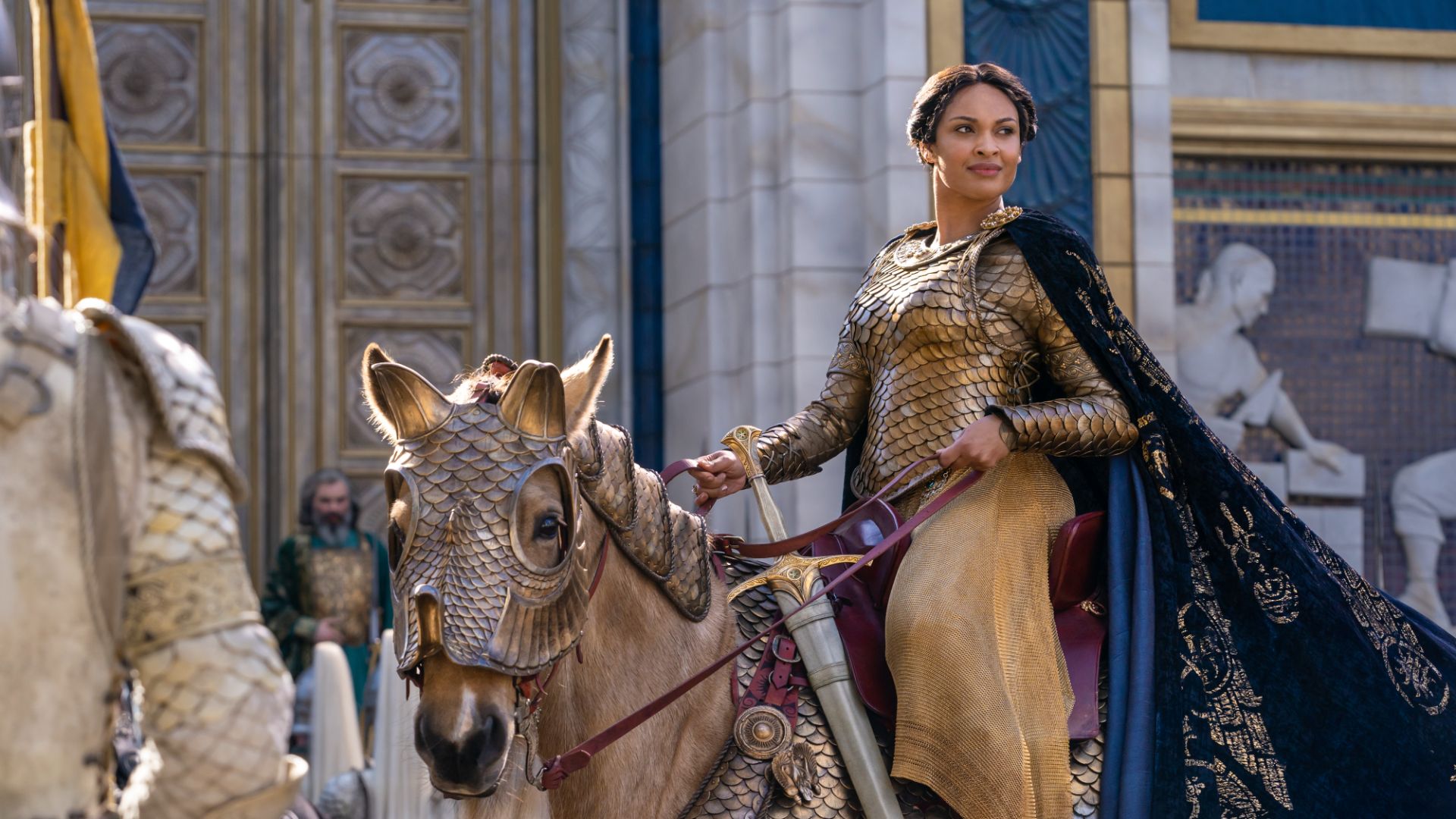GamesRadar+ Verdict
The Rings of Power dives deep into the politicking of Middle-earth for an excellent episode that plants the seeds of storylines that will pay off in the seasons to come.
Why you can trust GamesRadar+
Warning: the following contains spoilers for The Lord of the Rings: The Rings of Power episode 4. Turn back if you haven't seen the new installment in Amazon's epic Tolkien adaptation.
As an avid proponent of the weekly release schedule, it pains me to say this but, maybe Amazon should release The Rings of Power two episodes at a time? After all, that’s what the streamer did with the two-part premiere – the first hour being a nice introduction to the world of Middle-earth, the second immersing us in the story. With the third episode, I was left wondering who’s who in Númenor and grasping tightly to the characters we had already met. Now, thanks to ‘The Great Wave’, we have a better understanding of Númenorean politics and the people who live in the great city, and the episode is elevated as a result.
Cynthia Addai-Robinson's Míriel felt important last week, yet her story fell flat: we didn’t understand what was at stake for Númenor, and she came off as hostile to Galadriel. Within the first ten minutes of ‘The Great Wave’, we come to understand her pain. She has foreseen Númenor’s destruction. Also importantly, her advisor, Pharazôn, portrayed by Trystan Gravelle in a spectacular wig, is sowing the seeds of mistrust on the streets of the city, drawing a line between the Númenoreans and the Elves while forging himself as a man of the people – note that he says "I swear that Elven hands will never take Númenor’s helm" rather than the queen not allowing it to happen. (There are some very real-world parallels as the men of Númenor fear the immigration of Elves, which feels purposeful but also in keeping with how Tolkien framed the story of this doomed island.)
The strife has been caused by Galadriel, who’s soon locked in the dungeons of Númenor after an intense encounter with the queen. It’s a scene in which Morfydd Clark truly embodies Cate Blanchett’s Galadriel, with Clark commandingly raising her voice as she angrily announces, "There is a tempest in me!" Turns out she can be a commander in great halls as well as on the battlefield. However, as Halbrand later points out, she has a lot to learn, especially after she hastily and misguidedly breaks into Míriel’s father’s quarters and sees the aging king – a problem the immortal Elven kings would never suffer. She finds there’s much more to the queen’s anguish than simply not wanting an elf to meet him. It’s a shame that, when Míriel does decide to help Galadriel following the wilting of the white tree, the whole thing begins to feel rushed.
Back on Middle-earth, we’re treated to two equally brilliant stories that continue to develop in interesting ways. First, Arondir meets Adar, a name that means “father”. The make-up design on Joseph Mawle’s character is particularly interesting – he’s some sort of poisoned elf. In Tolkien’s work, Elves don’t work for Sauron willingly: they were once tortured by Morgoth and transformed into Orcs. This would seemingly be why the creatures refer to him as their father, as he’s potentially their forbearer. Surprisingly, we also see a side of the Orcs that we’ve never really seen on screen before. One of them lies dying, yet the others have brought him back into their tunnel and have tried to save him. Adar puts the Orc out of his misery. It’s as if Adar, though on the side of evil, cares for his workforce. There’s a lot to unpack here…
Arondir is set free and given a message for the people of the Southlands. Meanwhile, his forbidden human lover Bronwyn has taken refuge in a watch post with the other humans, though they’re quickly running out of food. Theo, her son, goes back to the village to be a hero and find supplies but he ends up using his cursed blade against the Orcs. It is, as predicted, the weapon that they have been searching for. Arondir soon saves Theo, and there’s an excellent chase through the woods, but now that knowledge of the weapon’s whereabouts is heading back to Adar, we can expect a battle to come.
There’s also the fact the twisted human barkeeper knows that Theo has the hilt. He confirms that it once belonged to Sauron – and it transpires the Elves were right to watch over these men this whole time as they still have the capacity to be turned to the Dark Lord’s side. Where the Lord of the Rings movies had distinct good guys and villains, The Rings of Power is beginning to play in shades of grey a little more, furthering the series from its cinematic forbearers.
There’s also some trickery in Khazad-dûm. Elrond’s looking for Durin and having little luck finding the prince thanks to Disa telling a few lies. Eventually, Durin reveals that the Dwarves are digging deep and have found mithril, the only mineral that Tolkien ever invented and the metal that will one day be worn in coat form by Frodo Baggins (it’s also worth noting that the Ring of Power that one day will be worn by Galadriel is made of mithril). While burying into Khazad-dûm not be the best idea, it does lead to an excellent scene with Disa singing to the stones and becoming closer to Elrond.
However, we again see mistrust between races: Durin goes to his father and they agree that Durin must go to Lindon to find out what’s really going on with the Elves. It’s a touching scene between father and son and, despite them being Dwarves, it’s not played for laughs. The showrunners said before the series started that they wanted to take Dwarves more seriously, and they’re certainly doing that.
There are so many seeds being sewn that a few stories get the short straw. Númenor has so many key characters that Isildur, the one-day slayer of Sauron, makes little impact, and his sister, though given a fair amount of screen time, suffers from being surrounded by much more interesting characters. Still, ‘The Great Wave’ builds on the introductions of last week for an episode that’s extremely dense and had me completely immersed. Let’s do this again next week, shall we? I’m not sure I can juggle meeting any more new faces. Or if we’re going to meet a load of new people, at least give us two episodes, Amazon!
The Lord of the Rings: The Rings of Power is available now on Amazon Prime Video. After more Rings content? Check out our guide to the Lord of the Rings timeline and our interviews with the Rings of Power cast and showrunners.
More info
| Genre | Fantasy |

Jack Shepherd is the former Senior Entertainment Editor of GamesRadar. Jack used to work at The Independent as a general culture writer before specializing in TV and film for the likes of GR+, Total Film, SFX, and others. You can now find Jack working as a freelance journalist and editor.



